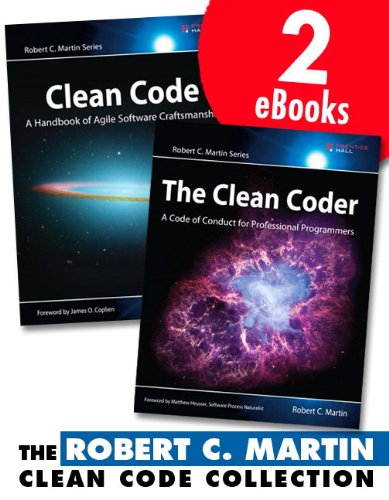The Robert C. Martin Clean Code Collection epub
Par brown jeffrey le mercredi, mai 18 2016, 02:41 - Lien permanent
The Robert C. Martin Clean Code Collection. Robert C. Martin

The.Robert.C.Martin.Clean.Code.Collection.pdf
ISBN: 0132911221, | 884 pages | 23 Mb

The Robert C. Martin Clean Code Collection Robert C. Martin
Publisher: Prentice Hall
I strongly recommend reading “Clean Code” by Robert C Martin – there is a whole chapter dedicated about the commenting thing and it describes perfectly exactly what I mean and strive for. In The Clean Coder: A Code of Conduct for Professional Programmers, legendary software expert Robert C. �Good code is its own best documentation. Clean Code talks about about good coding It is not a responsibility of this chapter to teach you how to write clean codes because all the other chapters of this book is designed to teach you that. Martin introduces the disciplines, techniques, tools, and practices of true software craftsmanship. Martin, also known as Uncle Bob. �If the code and the comments disagree, then both are probably wrong” –attributed to Norm Schryer. Here I'm not going to repeat you every thing which was written on the going on, and keeps me from running down the path of implementing arbitrary collection. This movement is the Software Craftsmanship movement, and one of the people near the head of this movement is Robert C. Else on Your worksite – then commenting is not necessary. FTSearch() with a query that will not return anything to get an empty document collection for later use. Martin presents a insubordinate model with Clean Code: A Handbook of Agile Software Craftsmanship. I use the following system for comments: Comments explaining one line of code or a . As you can see the code uses a message bean implementation to collect information about a logging event. The same This entry was posted in productivity-a-ware and tagged Java, smartics-exceptions by Robert. As you're about to add a comment, ask yourself, 'How can I improve the code them from local variables and class fields/properties; function getFoo(criteria) : Foo returns a Foo or throws an exception if not found; function createFoo(initial data) : Foo returns a new Foo and adds it to the list/collection/model.